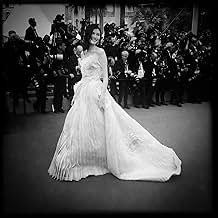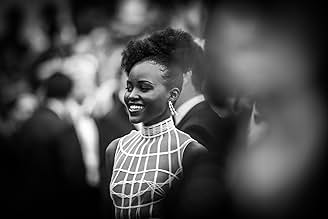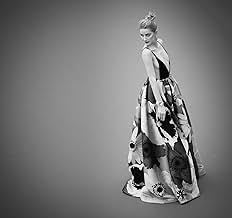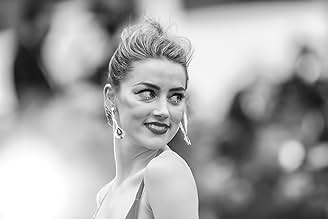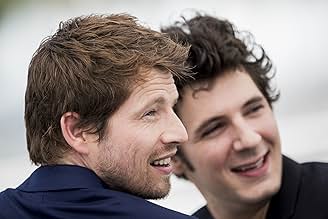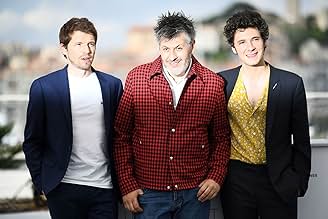AVALIAÇÃO DA IMDb
6,8/10
4,4 mil
SUA AVALIAÇÃO
Um escritor parisiense e um jovem estudante de Rennes se apaixonam.Um escritor parisiense e um jovem estudante de Rennes se apaixonam.Um escritor parisiense e um jovem estudante de Rennes se apaixonam.
- Direção
- Roteirista
- Artistas
- Prêmios
- 6 vitórias e 11 indicações no total
Marlene Saldana
- L'actrice
- (as Marlène Saldana)
Avaliações em destaque
I have mixed feelings about this movie. It's not bad, but it's not awesome either. Some other gay films, such as « Call me by your name » and « Beats per minute », moved me more than this one. Moreover, this love affair sounds a bit unrealistic, given the circumstances (disease, distance and age gap). Fortunately, there are nice moments of tenderness (the reunion in Paris), emotion (the last scene) and humor (Denis Podalydès' choreography or Vincent Lacoste's striptease). The soundtrack features some good music, such as the delicate song « Les gens qui doutent ».
To Please, to Love, and to Run Quickly is nowhere near the sentimental use of the word sorry, and who is the angel? I also dislike the three in a bed image used on the poster as it bears little resemblance to the content of the film. I will give no spoilers, but I did not see one sexual threesome. and to be honest the sexuality in the film was coy and of the 'hide the penis at all costs' school. For those who have read my reviews please see the one on 'Theo and Hugo'.
I have awarded this film 7/10 because I thought it was a good film but not as good as it could have been. The dialogue in French is brutally difficult to follow as there is a lot of slurping over words and saying things in a way that you can only truly follow if you are in the same room with the people speaking, and then .... I found the characters drab, and the bisexual Breton tiresome.
And now for a major criticism about films set in the past about Aids. Where were the films during that period of the crisis? This retro look back makes me angry. Film makers should have had the courage back then to deal with this period in our history. Films like 'Theo and Hugo' are masterful as they deal with the situation now and are up to date. One reviewer here summed this up for me. He or she says, love-and romanticism-in the days of AIDS. In the days of? This is not a past thing. The days are now. Homosexuality and HIV are now. And yes as a friend of mine said, they need to know how it was, but frankly with a still on-going crisis we need to know how it IS.
One good element of this film is that it shows a child in a homosexual household in a positive way, and despite my slight boredom with the relationships, it is at least about an important issue. French film is waking up to homosexuality thanks to a list of good directors, and the dark negativity of the Nouvelle Vague, where love was strictly heterosexual, has slipped back into the waters from where it came. The Nouvelle Vague liberated image, but was feeble on diversity and dodgy on politics. Honore is a great director, but I am still waiting for his great film.
I have awarded this film 7/10 because I thought it was a good film but not as good as it could have been. The dialogue in French is brutally difficult to follow as there is a lot of slurping over words and saying things in a way that you can only truly follow if you are in the same room with the people speaking, and then .... I found the characters drab, and the bisexual Breton tiresome.
And now for a major criticism about films set in the past about Aids. Where were the films during that period of the crisis? This retro look back makes me angry. Film makers should have had the courage back then to deal with this period in our history. Films like 'Theo and Hugo' are masterful as they deal with the situation now and are up to date. One reviewer here summed this up for me. He or she says, love-and romanticism-in the days of AIDS. In the days of? This is not a past thing. The days are now. Homosexuality and HIV are now. And yes as a friend of mine said, they need to know how it was, but frankly with a still on-going crisis we need to know how it IS.
One good element of this film is that it shows a child in a homosexual household in a positive way, and despite my slight boredom with the relationships, it is at least about an important issue. French film is waking up to homosexuality thanks to a list of good directors, and the dark negativity of the Nouvelle Vague, where love was strictly heterosexual, has slipped back into the waters from where it came. The Nouvelle Vague liberated image, but was feeble on diversity and dodgy on politics. Honore is a great director, but I am still waiting for his great film.
The person who saw Sorry Angel with me initially mislabeled it as another gay-AIDS-relationship movie, missing the point: It ain't what you do, it's the way that you do it. Christophe Honore never lacks ideas, and--to his good fortune--he does what he pleases. He takes risks and successfully avoids cliches; Honore is one of the world's brightest, funniest, savvy auteurs...His movies are earmarked by nostalgic romanticism, but they never wallow in the past because he is able to pay tribute without imitation, a technique that evades so many of his contemporaries.
Sorry Angel is about relationships. You do not need to be gay to watch it, but you need to understand humanity and compassion. Honore gets to the meat without chewing on the fat while his poignant dialogue is relatable to everyone eventually. The context of the movie (the 90's AIDS epidemic) is a setting for the text (based on the director's university years and his gay idols, writers and directors who died from the disease) but it is the subtext, Honore's observations about relationships--discerning, unsentimental, realistic portrayals of humans both gay and straight--which elevates the movie to the forefront of cinematic reflections. Where Robin Campillo's recent BPM (another stunner) focuses on activism, Honore shows us sympathy and love during an era of uncertainty and chaos.
Jonathan Romney notes that Sorry Angel is a "novelistic film" because it presents itself like great literature. The plot might be purposefully transparent, but the devil is in the details.
Sorry Angel is about relationships. You do not need to be gay to watch it, but you need to understand humanity and compassion. Honore gets to the meat without chewing on the fat while his poignant dialogue is relatable to everyone eventually. The context of the movie (the 90's AIDS epidemic) is a setting for the text (based on the director's university years and his gay idols, writers and directors who died from the disease) but it is the subtext, Honore's observations about relationships--discerning, unsentimental, realistic portrayals of humans both gay and straight--which elevates the movie to the forefront of cinematic reflections. Where Robin Campillo's recent BPM (another stunner) focuses on activism, Honore shows us sympathy and love during an era of uncertainty and chaos.
Jonathan Romney notes that Sorry Angel is a "novelistic film" because it presents itself like great literature. The plot might be purposefully transparent, but the devil is in the details.
Two men fall in love with the idea of the other during the AIDS crisis and all hell breaks loose. Of course this is a storyline we've seen so many times in cinemas, but the truth is the approach in this one is very romantic and unique. The end result is sadly something I was expecting and of course not as powerful as it should have been. The main theme is not the AIDS pandemic but rather the way two people can fall in love so unexpectedly even if their lives are set in different directions. The movie drags a lot, is really slow-paced at times and the main protagonists are not always in focus thus never showcasing their chemistry. This could have been a different movie but sadly it almost feels unfinished or not fully realised.
This movie really made me feel great and calm, it's cute beautiful and heart-wrenching. first, the direction, Aesthetic, and production are very elegant it feels nostalgic and greeting and the non-linear, original way the story is told is very captivating. a charming story about two totally different men and their not so love at first sight romance. a perfect portrayal of gay men lives in the french 90, clandestine sex, aids, and loneliness tackled with a warming and funny manner it's truly the kind of movie that puts butterflies in your stomach, the production, the direction the story and the acting everything is top. it's very touching, funny, heartbreaking and it made me miss Paris & want to go there. I had a wonderful time this film made me want to live again; to explore and love; the romance between Jacques and Arthur as unconventional as it is was pleasing plus Pierre Deladonchamps was very touching and faultless in his role. one of the best movies I saw this year
Você sabia?
- CuriosidadesThe character of Jacques (Pierre Deladonchamps) shares his surname with Pier Vittorio Tondelli, an Italian author who died of AIDS.
- Citações
Pierre: Cruelty is not one man wounding another, mutilating or torturing him, severing his limbs or his head, or even making him cry. The true, terrible cruelty is that a man who cuts another off, interrupting him like dots in a sentence, or looking away from him, making him an error of the gaze, an error of judgement, an error like a letter crumpled up after starting it, after writing the date.
- Trilhas sonorasOne Love
Performed by Massive Attack
Principais escolhas
Faça login para avaliar e ver a lista de recomendações personalizadas
- How long is Sorry Angel?Fornecido pela Alexa
Detalhes
Bilheteria
- Orçamento
- € 3.610.000 (estimativa)
- Faturamento bruto nos EUA e Canadá
- US$ 30.628
- Fim de semana de estreia nos EUA e Canadá
- US$ 6.559
- 17 de fev. de 2019
- Faturamento bruto mundial
- US$ 1.636.273
- Tempo de duração2 horas 12 minutos
- Cor
- Proporção
- 1.85 : 1
Contribua para esta página
Sugerir uma alteração ou adicionar conteúdo ausente

Principal brecha
By what name was Conquistar, Amar e Viver Intensamente (2018) officially released in India in English?
Responda
![Assistir a Bande-annonce [OV]](https://m.media-amazon.com/images/M/MV5BMGQ2ZDgwYTUtMmRhYy00ZDNkLWI1OTctZTc1YjMxM2ZkMmY2XkEyXkFqcGdeQXRodW1ibmFpbC1pbml0aWFsaXplcg@@._V1_QL75_UX500_CR0)
